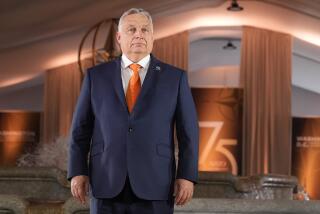Shultz Praises Hungary Leader, Sees Trade Hike
- Share via
BUDAPEST, Hungary — Secretary of State George P. Shultz on Monday praised the “wisdom” of Communist Party leader Janos Kadar and predicted increases in trade between the United States and Hungary.
“My discussions were quite rewarding as far as I’m concerned,” Shultz told a press conference. “I had some things to say, but I did a lot of listening. I think I heard a great deal of wisdom. . . . Mr. Kadar is an interesting interlocutor and well worth listening to.”
Shultz’s comments, reflecting a warming trend in relations between the two nations, were a remarkable tribute to the 73-year-old Communist Party leader, who was installed in power almost 30 years ago by Soviet bayonets and tanks following the brutal suppression of the 1956 Hungarian uprising.
Shultz was the first secretary of state to visit Budapest since January, 1978, when Cyrus R. Vance came to Hungary to return the 900-year-old Crown of St. Stephen, Hungary’s national symbol, which had been held in the United States since the closing days of World War II.
‘I Am Here to Learn’
A senior State Department official said Shultz began his meetings with Kadar, Premier Gyorgy Lazar and other Hungarian officials by saying, “I am here to learn.”
“We weren’t putting forward any particular requests for them, and we weren’t receiving any particular requests from them” with the exception of a Hungarian request for an adjustment of trade regulations, said the U.S. official, who declined to be identified.
The purpose of the visit, in the State Department’s view, was to show American interest in Hungary’s economic policy, probably the most free-wheeling of any nation in the East Bloc. To do that, Shultz was prepared to overlook Budapest’s foreign policy, which follows the Moscow line, and the crushing of the 1956 uprising.
Hungary conducts about half of its trade with the West, although the percentage with the United States is quite low. Shultz predicted substantial increases in U.S.-Hungarian trade in the coming years.
Warming Trend
From the Hungarian side, the chief objective appeared to be to nurture the warming trend in U.S.-Soviet relations emanating from the Geneva summit meeting last month.
“There was an expression that the Geneva meeting produced a different atmosphere, and (Hungarian officials) are hoping we will take advantage of the opportunities it might create,” said the U.S. official. “We have been hearing that the atmosphere of the superpower relationship determines the atmosphere in which the Eastern Europeans must operate.”
U.S. officials said there were no confrontations in Budapest like the one Sunday in Bucharest when Shultz told Romanian President Nicolae Ceausecu that the Bucharest government must improve its human rights policy or face the loss of U.S. trade concessions.
Romania and Hungary are the only members of the Soviet-led Warsaw Pact that enjoy “most-favored-nation” tariff status which allows them to sell their goods in the United States on the same terms as other friendly nations.
The trade act of 1974 which permitted extension of most-favored-nation status to Communist nations makes that status subject to annual renewal by Congress.
Preferential Status
Shultz said Kadar and other Hungarian officials asked that Hungary’s preferential status be made permanent or at least made subject to renewal only every three years.
Shultz said it was unlikely that the annual review would be scrapped, although he said there is no opposition in Congress to the Hungarian extension.
“Any one who makes the assumption (that the status will continue) under today’s conditions makes a correct assumption,” Shultz said.
Kadar met Shultz in a small library in the Communist Party headquarters building. The books, displayed in orderly rows on shelves behind glass doors, included, in addition to books by and about Kadar and several multi-volume tomes about the Soviet Union, two biographies of Abraham Lincoln, including one by Carl Sandburg.
As the meeting got under way, Shultz admired an ornate silver cigarette box.
“It’s good on the outside, but what is on the inside isn’t good for you,” Shultz told Kadar, a heavy smoker.
More to Read
Sign up for Essential California
The most important California stories and recommendations in your inbox every morning.
You may occasionally receive promotional content from the Los Angeles Times.













